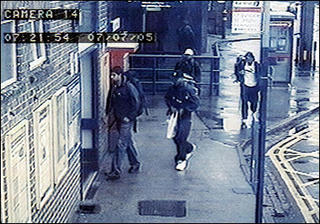Sunday, July 17, 2005
A-sassy-ns
 At the "Guardian", they're getting extremists to write about other extremists, which at least means that some "G" journalists know what they're talking about. In fact, the "Guardian" finally has their first staff member who would acknowledge that it's not all about Iraq but about the establishment of the Caliphate.
At the "Guardian", they're getting extremists to write about other extremists, which at least means that some "G" journalists know what they're talking about. In fact, the "Guardian" finally has their first staff member who would acknowledge that it's not all about Iraq but about the establishment of the Caliphate.Anyway, Dilpazier Aslam, a Caliphate enthusiast and now a "Guardian" trainee journalist has this to say about the British Islamic community:
The Muslim community is no monolithic whole. Yet there are some common features. Second- and third-generation Muslims are without the don't-rock-the boat attitude that restricted our forefathers. We're much sassier with our opinions, not caring if the boat rocks or not.(via Tim Blair and Michelle Malkin) Don't-rock-the-boat attitude restricted forefathers to opening fish and chip shops and other small businesses that contributed to the economic well-being of the country and gave opportunities not available back home to the sassy second- and third-generation Muslims. How boring, how middle class, how kafir.
Above, the decidedly un-fab four on their way to martyrdom. Some reports suggest that the four might not have intended to become suicide bombers but were duped by the master-bomber who lied to them about when the explosives would go off. The police think this might be the case because the four:
- paid for parking their car at a train station
- bought return tickets
- weren't actually strapped with explosive belts
- didn't shout "Allah Akbar" before detonating
But back to Dilpazier Aslam. The left-wing competitor "The Independent" has a delightful take on the controversy:
Sources in The Guardian said that Mr Aslam was employed to increase ethnic diversity within the newsroom under The Guardian's one-year traineeship scheme.The problem is not that they're a bit "pale and male"; the problem is that they all think the same, regardless of gender or color.
One source said: "There was a feeling that we genuinely wanted more diversity, and like all national newspapers we were still a bit 'pale and male' so we were keen to recruit from different backgrounds."
In 1994 Richard Gott, a veteran Guardian journalist, resigned as literary editor after he was unmasked as a former KGB spy. He admitted meeting the Russians and going on expenses-paid trips, but denied taking money.
One shouldn't be too harsh on "The Guardian"; after all, it wouldn't be the first newspaper to over the years have a Soviet agent and a jihad apologist on its staff. But it doesn't surprise.
|



